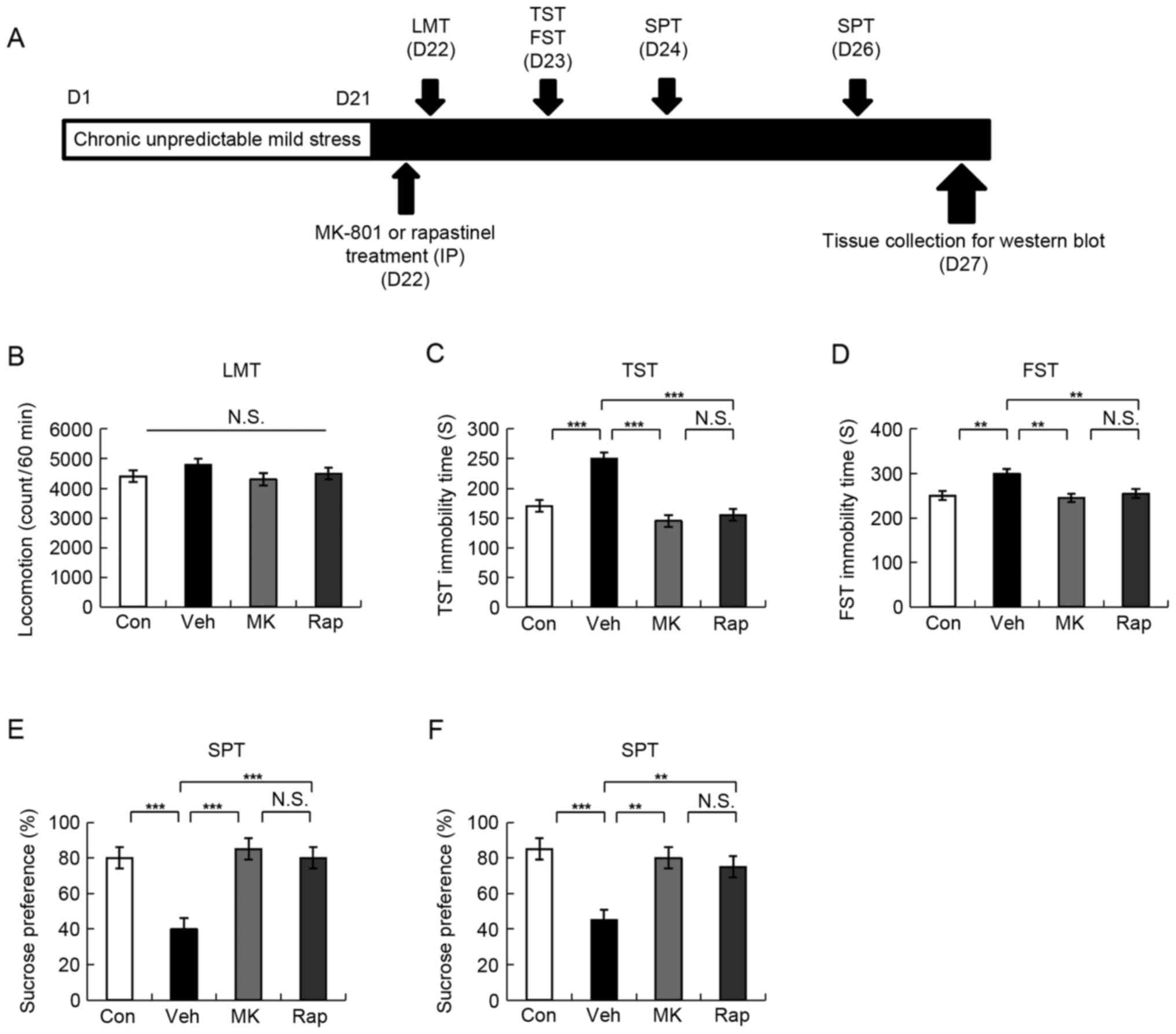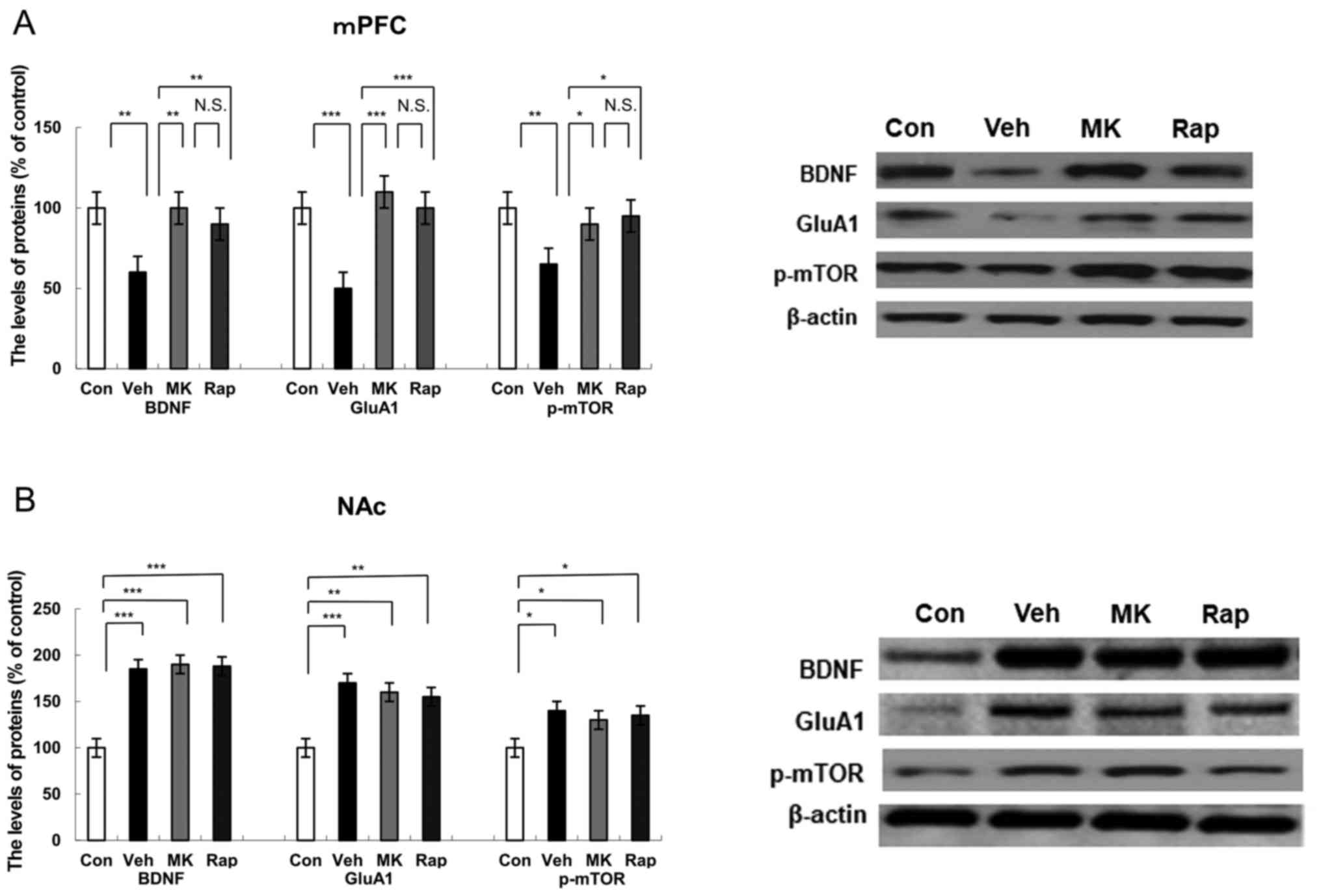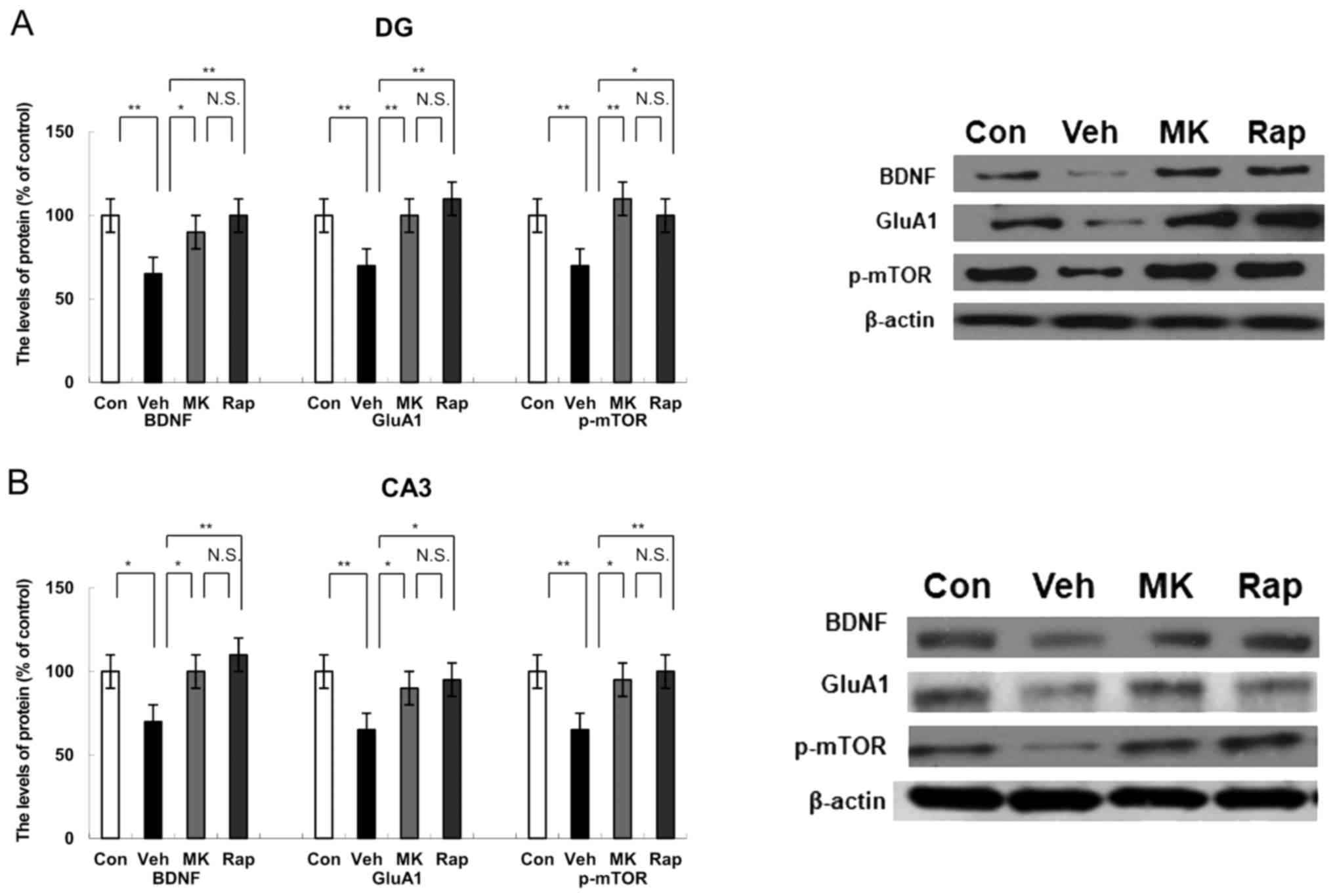|
1
|
Monteggia LM and Zarate CA Jr:
Antidepressant actions of ketamine: From molecular mechanisms to
clinical practice. Curr Opin Neurobiol. 30:139–143. 2015.
View Article : Google Scholar : PubMed/NCBI
|
|
2
|
Hashimoto K: Inflammatory biomarkers as
differential predictors of antidepressant response. Int J Mol Sci.
16:7796–7801. 2015. View Article : Google Scholar : PubMed/NCBI
|
|
3
|
Chaki S and Fukumoto K: Potential of
glutamate-based drug discovery for next generation antidepressants.
Pharmaceuticals (Basel). 8:590–606. 2015. View Article : Google Scholar : PubMed/NCBI
|
|
4
|
Schosser A, Serretti A, Souery D,
Mendlewicz J, Zohar J, Montgomery S and Kasper S: European group
for the study of resistant depression (GSRD)-where have we gone so
far: Review of clinical and genetic findings. Eur
Neuropsychopharmacol. 22:453–468. 2012. View Article : Google Scholar : PubMed/NCBI
|
|
5
|
Wong EH, Kemp JA, Priestley T, Knight AR,
Woodruff GN and Iversen LL: The anticonvulsant MK-801 is a potent
N-methyl-D-aspartate antagonist. Proc Natl Acad Sci USA.
83:7104–7108. 1986. View Article : Google Scholar : PubMed/NCBI
|
|
6
|
Burgdorf J, Zhang XL, Nicholson KL,
Balster RL, Leander JD, Stanton PK, Gross AL, Kroes RA and Moskal
JR: GLYX-13, a NMDA receptor glycine-site functional partial
agonist, induces antidepressant-like effects without ketamine-like
side effects. Neuropsychopharmacology. 38:729–742. 2013. View Article : Google Scholar : PubMed/NCBI
|
|
7
|
Autry AE, Adachi M, Nosyreva E, Na ES, Los
MF, Cheng PF, Kavalali ET and Monteggia LM: NMDA receptor blockade
at rest triggers rapid behavioural antidepressant responses.
Nature. 475:91–95. 2011. View Article : Google Scholar : PubMed/NCBI
|
|
8
|
Zanos P, Moaddel R, Morris PJ, Georgiou P,
Fischell J, Elmer GI, Alkondon M, Yuan P, Pribut HJ, Singh NS, et
al: NMDAR inhibition-independent antidepressant actions of ketamine
metabolites. Nature. 533:481–486. 2016. View Article : Google Scholar : PubMed/NCBI
|
|
9
|
Yang B, Ren Q, Ma M, Chen QX and Hashimoto
K: Antidepressant effects of (+)-MK-801 and (−)-MK-801 in the
social defeat stress model. Int J Neuropsychopharmacol. 19(pii):
pyw0802016. View Article : Google Scholar : PubMed/NCBI
|
|
10
|
Moskal JR, Burgdorf JS, Stanton PK, Kroes
RA, Disterhoft JF, Burch RM and Khan MA: The development of
rapastinel (Formerly GLYX-13); A rapid acting and long lasting
antidepressant. Curr Neuropharmacol. 15:47–56. 2017. View Article : Google Scholar : PubMed/NCBI
|
|
11
|
Lu Y, Wang C, Xue Z, Li C, Zhang J, Zhao
X, Liu A, Wang Q and Zhou W: PI3K/AKT/mTOR signaling-mediated
neuropeptide VGF in the hippocampus of mice is involved in the
rapid onset antidepressant-like effects of GLYX-13. Int J
Neuropsychopharmacol. 18(pii): pyu1102014.PubMed/NCBI
|
|
12
|
Yang B, Zhang JC, Han M, Yao W, Yang C,
Ren Q, Ma M, Chen QX and Hashimoto K: Comparison of R-ketamine and
rapastinel antidepressant effects in the social defeat stress model
of depression. Psychopharmacology (Berl). 233:3647–3657. 2016.
View Article : Google Scholar : PubMed/NCBI
|
|
13
|
Preskorn S, Macaluso M, Mehra DO, Zammit
G, Moskal JR and Burch RM; GLYX-13 Clinical Study Group, .
Randomized proof of concept trial of GLYX-13, an
N-methyl-D-aspartate receptor glycine site partial agonist, in
major depressive disorder nonresponsive to a previous
antidepressant agent. J Psychiatr Pract. 21:140–149. 2015.
View Article : Google Scholar : PubMed/NCBI
|
|
14
|
Duman RS and Aghajanian GK: Synaptic
dysfunction in depression: Potential therapeutic targets. Science.
338:68–72. 2012. View Article : Google Scholar : PubMed/NCBI
|
|
15
|
Lepack AE, Fuchikami M, Dwyer JM, Banasr M
and Duman RS: BDNF release is required for the behavioral actions
of ketamine. Int J Neuropsychopharmacol. 18:pyu0332014. View Article : Google Scholar : PubMed/NCBI
|
|
16
|
Ohgi Y, Futamura T and Hashimoto K:
Glutamate signaling in synaptogenesis and NMDA receptors as
potential therapeutic targets for psychiatric disorders. Curr Mol
Med. 15:206–221. 2015. View Article : Google Scholar : PubMed/NCBI
|
|
17
|
Ren Q, Ma M, Ishima T, Morisseau C, Yang
J, Wagner KM, Zhang JC, Yang C, Yao W, Dong C, et al: Gene
deficiency and pharmacological inhibition of soluble epoxide
hydrolase confers resilience to repeated social defeat stress. Proc
Natl Acad Sci USA. 113:E1944–E1952. 2016. View Article : Google Scholar : PubMed/NCBI
|
|
18
|
Yang C, Shirayama Y, Zhang JC, Ren Q, Yao
W, Ma M, Dong C and Hashimoto K: R-ketamine: A rapid-acting and
sustained antidepressant without psychotomimetic side effects.
Transl Psychiatry. 5:e6322015. View Article : Google Scholar : PubMed/NCBI
|
|
19
|
Zhang JC, Yao W, Dong C, Yang C, Ren Q, Ma
M, Han M and Hashimoto K: Comparison of ketamine,
7,8-dihydroxyflavone and ANA-12 antidepressant effects in the
social defeat stress model of depression. Psychopharmacology
(Berl). 232:4325–4335. 2015. View Article : Google Scholar : PubMed/NCBI
|
|
20
|
Li N, Lee B, Liu RJ, Banasr M, Dwyer JM,
Iwata M, Li XY, Aghajanian G and Duman RS: mTOR-dependent synapse
formation underlies the rapid antidepressant effects of NMDA
antagonists. Science. 329:959–964. 2010. View Article : Google Scholar : PubMed/NCBI
|
|
21
|
Miller OH, Yang L, Wang CC, Hargroder EA,
Zhang Y, Delpire E and Hall BJ: GluN2B-containing NMDA receptors
regulate depression-like behavior and are critical for the rapid
antidepressant actions of ketamine. Elife. 3:e035812014. View Article : Google Scholar : PubMed/NCBI
|
|
22
|
Krystal JH, Sanacora G and Duman RS:
Rapid-acting glutamergic antidepressants: The path to ketamine and
beyond. Biol Psychiatry. 73:1133–1141. 2013. View Article : Google Scholar : PubMed/NCBI
|
|
23
|
Lodge D and Mercier MS: Ketamine and
phencyclidine: The good, the bad and the unexpected. Br J
Pharmacol. 172:4254–4276. 2015. View Article : Google Scholar : PubMed/NCBI
|
|
24
|
Haj-Mirzaian A, Kordjazy N, Haj-Mirzaian
A, Ostadhadi S, Ghasemi M, Amiri S, Faizi M and Dehpour A: Evidence
for the involvement of NMDA receptors in the antidepressant-like
effect of nicotine in mouse forced swimming and tail suspension
tests. Psychopharmacology (Berl). 232:3551–3561. 2015. View Article : Google Scholar : PubMed/NCBI
|
|
25
|
Hasler G, Bonwetsch R, Giovacchini G,
Toczek MT, Bagic A, Luckenbaugh DA, Drevets WC and Theodore WH:
5-HT1A receptor binding in temporal lobe epilepsy patients with and
without major depression. Biol Psychiatry. 62:1258–1264. 2007.
View Article : Google Scholar : PubMed/NCBI
|
|
26
|
Luykx JJ, Laban KG, van den Heuvel MP,
Boks MP, Mandl RC, Kahn RS and Bakker SC: Region and state specific
glutamate downregulation in major depressive disorder: A
meta-analysis of (1)H-MRS findings. Neurosci Biobehav Rev.
36:198–205. 2012. View Article : Google Scholar : PubMed/NCBI
|
|
27
|
Feyissa AM, Chandran A, Stockmeier CA and
Karolewicz B: Reduced levels of NR2A and NR2B subunits of NMDA
receptor and PSD-95 in the prefrontal cortex in major depression.
Prog Neuropsychopharmacol Biol Psychiatry. 33:70–75. 2009.
View Article : Google Scholar : PubMed/NCBI
|
|
28
|
Preskorn SH, Baker B, Kolluri S, Menniti
FS, Krams M and Landen JW: An innovative design to establish proof
of concept of the antidepressant effects of the NR2B subunit
selective N-methyl-D-aspartate antagonist, CP-101,606, in patients
with treatment-refractory major depressive disorder. J Clin
Psychopharmacol. 28:631–637. 2008. View Article : Google Scholar : PubMed/NCBI
|
|
29
|
Duman RS, Aghajanian GK, Sanacora G and
Krystal JH: Synaptic plasticity and depression: New insights from
stress and rapid-acting antidepressants. Nat Med. 22:238–249. 2016.
View Article : Google Scholar : PubMed/NCBI
|
|
30
|
Ren Q, Ma M, Yang C, Zhang JC, Yao W and
Hashimoto K: BDNF-TrkB signaling in the nucleus accumbens shell of
mice has key role in methamphetamine withdrawal symptoms. Transl
Psychiatry. 5:e6662015. View Article : Google Scholar : PubMed/NCBI
|
|
31
|
Yang C, Shirayama Y, Zhang JC, Ren Q and
Hashimoto K: Regional differences in brain-derived neurotrophic
factor levels and dendritic spine density confer resilience to
inescapable stress. Int J Neuropsychopharmacol. 18:pyu1212015.
View Article : Google Scholar : PubMed/NCBI
|
|
32
|
Hashimoto K: Sigma-1 receptor chaperone
and brain-derived neurotrophic factor: Emerging links between
cardiovascular disease and depression. Prog Neurobiol. 100:15–29.
2013. View Article : Google Scholar : PubMed/NCBI
|
|
33
|
Yang B, Yang C, Ren Q, Zhang JC, Chen QX,
Shirayama Y and Hashimoto K: Regional differences in the expression
of brain-derived neurotrophic factor (BDNF) pro-peptide, proBDNF
and preproBDNF in the brain confer stress resilience. Eur Arch
Psychiatry Clin Neurosci. 266:765–769. 2016. View Article : Google Scholar : PubMed/NCBI
|
|
34
|
Hashimoto K, Malchow B, Falkai P and
Schmitt A: Glutamate modulators as potential therapeutic drugs in
schizophrenia and affective disorders. Eur Arch Psychiatry
Neurosci. 263:367–377. 2013. View Article : Google Scholar
|
|
35
|
Shirayama Y, Yang C, Zhang JC, Ren Q, Yao
W and Hashimoto K: Alterations in brain-derived neurotrophic factor
(BDNF) and its precursor proBDNF in the brain regions of a learned
helplessness rat model and the antidepressant effects of a TrkB
agonist and antagonist. Eur Neuropsychopharmacol. 25:2449–2458.
2015. View Article : Google Scholar : PubMed/NCBI
|

















